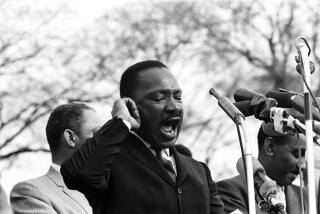Martin Luther Kingâs real message
Amid the celebration of the 50th anniversary of the March for Jobs and Freedom, there was a recurring complaint: What about economic justice?
It is a source of enormous frustration among many on the left that Martin Luther King Jr.âs deservedly iconic status doesnât lend more support and credence to his economic ideas.
The line âI have a dream that my four little children will one day live in a nation where they will be judged not by the color of their skin but by the content of their characterâ resides in the rhetorical pantheon with âFour score and seven years agoâ and âWe the people of the United States, in order to form a more perfect union.â
PHOTOS: Looking back at the March on Washington
In one of the fascinating ironies that make history so compelling, King didnât plan to use the âI have a dreamâ line. His prepared remarks were winding down when the gospel singer Mahalia Jackson shouted to him, âTell them about the dream, Martin! Tell them about the dream!â â a passage she had heard from him previously.
Even after the march, A. Philip Randolph, its director and opening speaker received more coverage than King. Randolph spoke of civil rights, but he also emphasized more typical left-wing economic fare: âIt falls to us to demand new forms of social planning, to create full employment and to put automation at the service of human needs, not at the service of profits.â
The left-wing journalist Murray Kempton said of the marchâs overall message: âNo expression one-tenth so radical has ever been seen or heard by so many Americans.â
Many on the left have felt frustrated that this agenda, subscribed to wholeheartedly by King, doesnât share the same moral and political stature as Kingâs dream of a colorblind society.
The frustration is understandable, but it stems from a fundamental confusion. As many have long noted, the genius of Kingâs appeal to an ideal of colorblindness was deeply patriotic, rooted in the foundational principles of the republic. The march was set in the year of the 100th anniversary of the Emancipation Proclamation, which King invoked: âBut 100 years later, the Negro still is not free. One hundred years later, the life of the Negro is still sadly crippled by the manacles of segregation and the chains of discrimination.â
âIn a sense,â King continued, âwe have come to our nationâs capital to cash a check. When the architects of our republic wrote the magnificent words of the Constitution and the Declaration of Independence, they were signing a promissory note to which every American was to fall heir. This note was a promise that all men, yes, black men as well as white men, would be guaranteed the unalienable rights of life, liberty and the pursuit of happiness.â
In the American context, these are universal appeals. King pleaded for the fulfillment of Americaâs classically liberal revolution. At the core of that revolution was the concept of negative liberty â being free from government-imposed oppression. That is why the rights in the Bill of Rights are framed in the negative or designed to restrict the power of government. âThe Congress shall make no lawâ that abridges freedom of speech, assembly, etc.
This arrangement has never fully satisfied the left. The founding philosopher of American progressivism, John Dewey, argued for positive rights: We have the right to material things â homes, jobs, education, healthcare, etc. Herbert Croly, the author of the progressive bible âThe Promise of American Life,â argued that only by turning America into a European-style cradle-to-grave social democracy could our âpromiseâ be fulfilled. Franklin D. Roosevelt tried to in effect replace the Bill of Rights with an âeconomic bill of rights.â That was the intellectual tradition of Randolph and, to a significant degree, Barack Obama.
But in America at least, appeals to social planning and guaranteed economic rights are not universal. They are, deservedly, controversial and contestable â all the more so when decoupled from the idea of colorblindness.
Today, conservatives, who were too often on the wrong side of civil rights in 1963, are champions of race neutrality, while Kingâs self-appointed heirs are more inclined to champion the ideas that never spoke to the hearts of all Americans.
More to Read
A cure for the common opinion
Get thought-provoking perspectives with our weekly newsletter.
You may occasionally receive promotional content from the Los Angeles Times.











